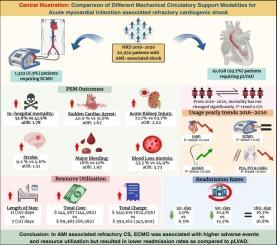对接受早期血运重建的急性心肌梗死相关心源性休克患者采用不同机械循环支持模式的趋势和结果
IF 1.3
Q3 CARDIAC & CARDIOVASCULAR SYSTEMS
American heart journal plus : cardiology research and practice
Pub Date : 2024-10-01
DOI:10.1016/j.ahjo.2024.100468
引用次数: 0
摘要
背景机械循环支持(MCS)设备在心源性休克(CS)中的使用日益增多。然而,在急性心肌梗死相关性心源性休克(AMI-CS)中使用不同 MCS 模式及其结果的最新趋势尚不清楚。方法使用国家再入院数据库(2016-2020 年)来识别需要 MCS 的 AMI-CS。队列按 ECMO 与 Impella 进行分层。采用倾向评分匹配法(PSM)去除混杂因素。对匹配队列进行皮尔逊 x2 检验,以比较结果。结果在 20,950 例需要 MCS 的 AMI-CS 住院患者中,19,628 例(93.7%)接受了 Impella 治疗,1322 例(6.3%)仅接受了 ECMO 治疗。ECMO 组患者更年轻(中位年龄:61 岁 vs. 68 岁,p < 0.001),合并症负担更轻。在倾向匹配队列(742 人)中,ECMO 队列的不良事件较多,包括死亡率(51.6% 对 41.5%)、心脏骤停(SCA)(40.9% 对 31.8%)、急性中风(9.2% 对 4.6%)和大出血(16% 对 12.2%)[p <0.05]。然而,将 ECPELLA(ECMO + Impella)与单独使用 Impella 相比,死亡率(46.2% 对 39.4%)和 SCA(44% 对 36.4%)相似,但大出血率更高(18.2% 对 9.8%)。从 2016 年到 2020 年,美国 AMI-CS 的死亡率趋势没有显著变化(P-趋势:0.071)。与 Impella 相比,使用 ECMO 而不进行 LV 负载显示出更高的死亡率和不良事件。需要进行前瞻性研究来验证这些发现。本文章由计算机程序翻译,如有差异,请以英文原文为准。

Trends and outcomes of different mechanical circulatory support modalities for acute myocardial infarction associated cardiogenic shock in patients undergoing early revascularization
Background
The use of Mechanical Circulatory Support (MCS) devices in cardiogenic shock (CS) is growing. However, the recent trends in using different MCS modalities and their outcomes in acute myocardial infarction associated CS (AMI-CS) are unknown.
Methods
The national readmission database (2016–2020) was used to identify AMI-CS requiring MCS. Cohorts were stratified as ECMO compared to Impella. Propensity score matching (PSM) was used to remove confounding factors. Pearson's x2 test was applied to matched cohorts to compare outcomes. We used multivariate regression and reported predictive margins for adjusted trend analysis.
Results
Among 20,950 AMI-CS hospitalizations requiring MCS, 19,628 (93.7 %) received Impella vs 1322 (6.3 %) were placed only on ECMO. ECMO group was younger (median age: 61 vs. 68 years, p < 0.001) and had a lower comorbidity burden. On propensity-matched cohorts (N 742), the ECMO cohort had higher adverse events, including mortality (51.6 % vs. 41.5 %), sudden cardiac arrest (SCA) (40.9 % vs. 31.8 %), acute stroke (9.2 % vs. 4.6 %) and major bleeding (16 % vs 12.2 %) [p < 0.05]. However, comparing ECPELLA (ECMO + Impella) to Impella alone, mortality (46.2 % vs. 39.4 %) and SCA (44 % vs. 36.4 %) rates were similar, though major bleeding was higher (18.2 % vs. 9.8 %). From 2016 to 2020, mortality trends for AMI-CS in the U.S. showed no significant change (p-trend: 0.071).
Conclusion
Despite advances in MCS modalities, the overall mortality rate for AMI-CS remains unchanged. ECMO use without LV unloading showed higher mortality and adverse events compared to Impella. Prospective studies are needed to verify these findings.
求助全文
通过发布文献求助,成功后即可免费获取论文全文。
去求助
来源期刊

American heart journal plus : cardiology research and practice
Cardiology and Cardiovascular Medicine
CiteScore
1.60
自引率
0.00%
发文量
0
审稿时长
59 days
 求助内容:
求助内容: 应助结果提醒方式:
应助结果提醒方式:


